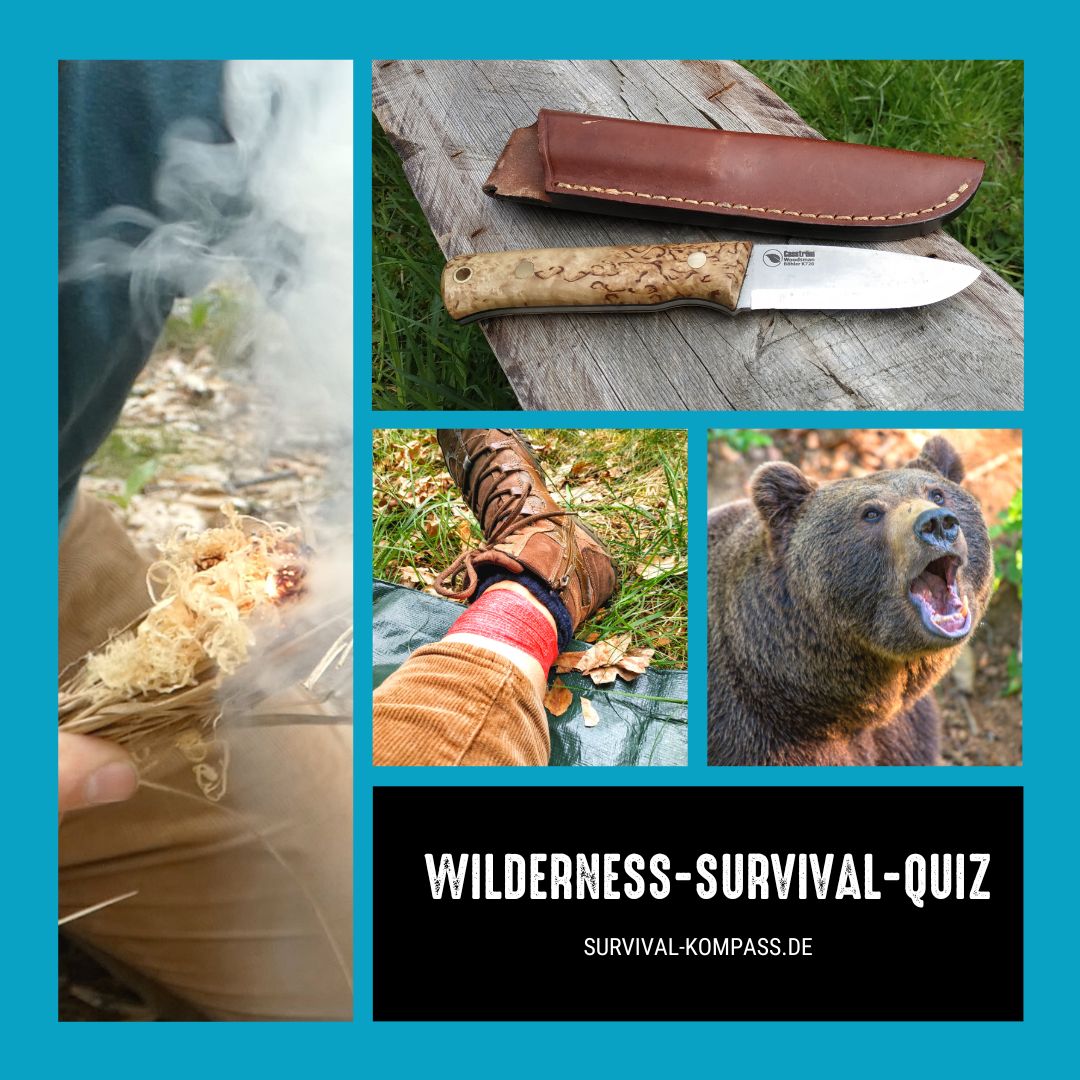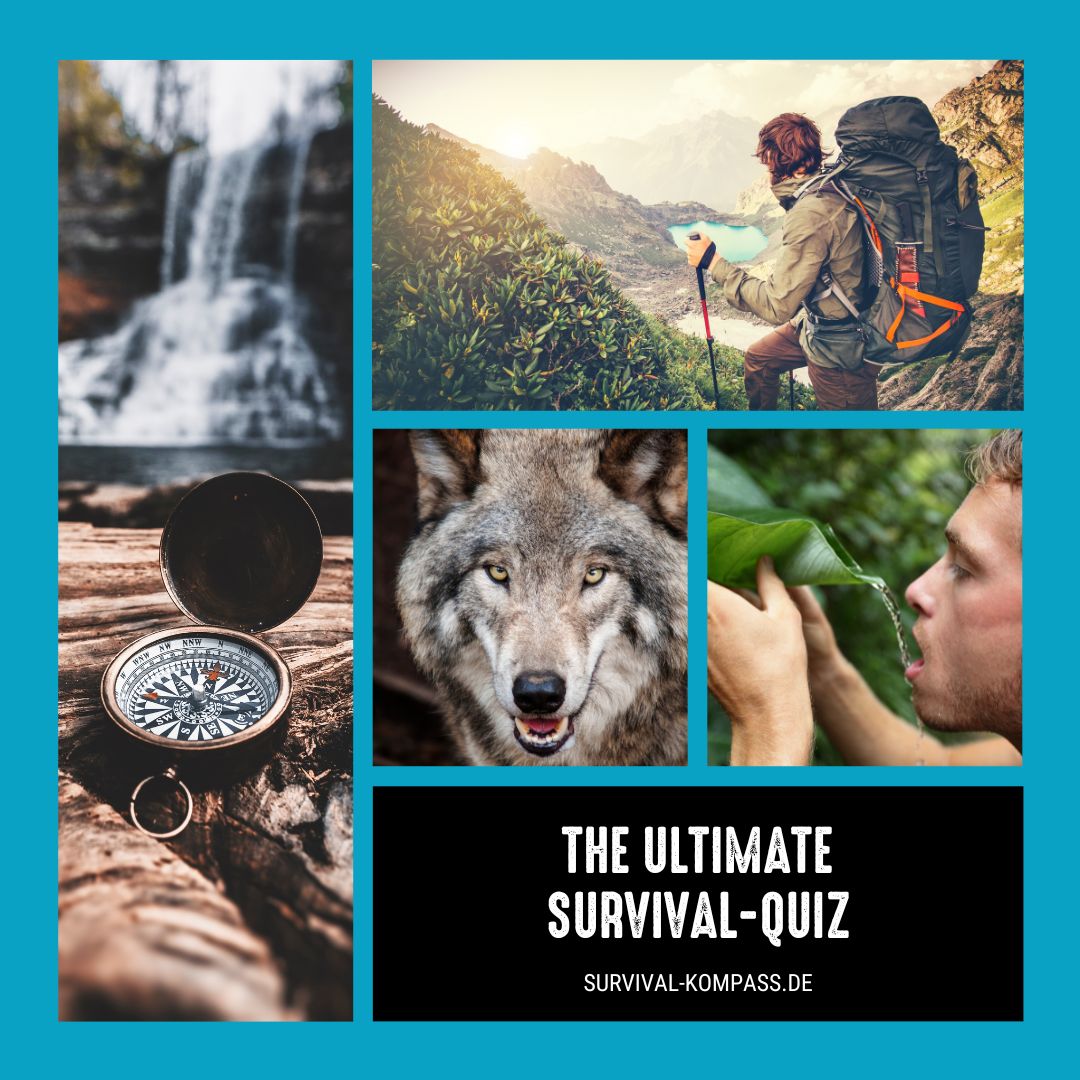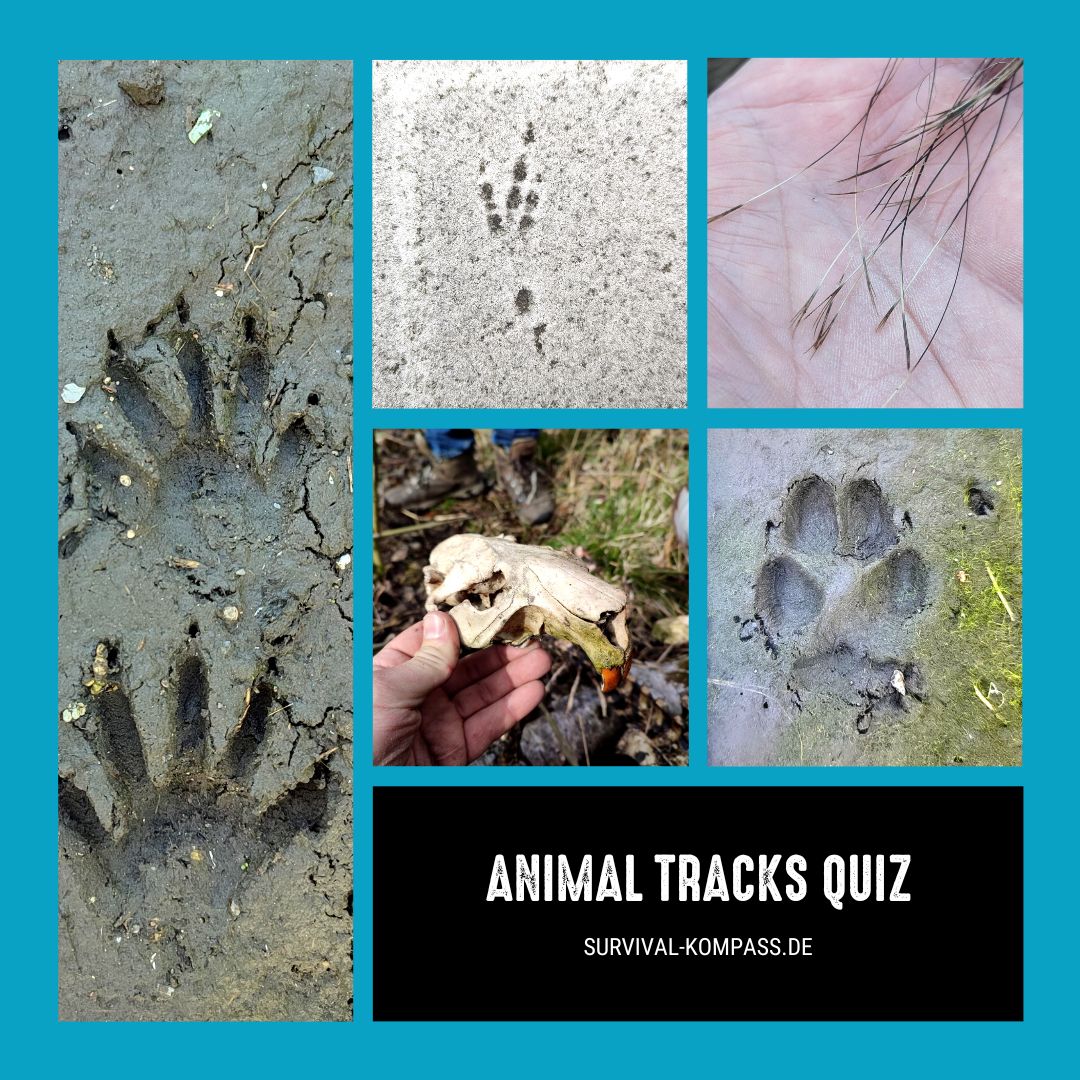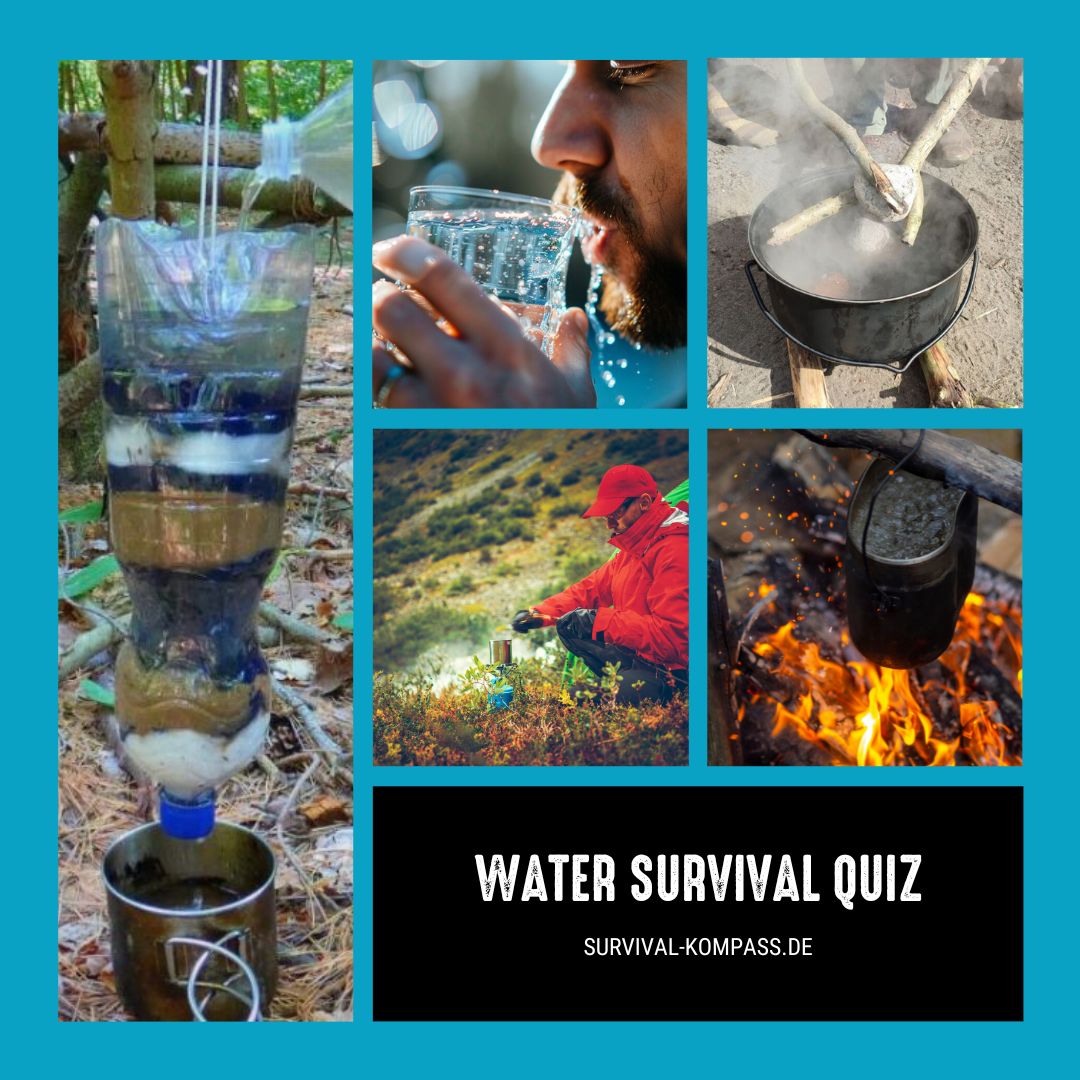

The Wilderness Survival Quiz
This quiz tests your knowledge of wilderness survival. Whether it's finding drinking water or handling a wild animal encounter, get ready for the ultimate survival challenge.
317 visitors have already taken the quiz and achieved an average score of 80 %. Can you do better?
Question 1 of 28
What mindset should you adopt when you find yourself in an emergency?
It may sound strange, but when you try to boost your mood with a positive attitude, the actual events are literally distorted. You may still be attacked by a bear – but hey, at least you don't have to go to work today.
Question 2 of 28
How can you make water drinkable in the wild?
Water from the wilderness is not always safe to drink. Boil it for a few minutes to kill any pathogens.
Question 3 of 28
What should you do if a grizzly bear attacks you?
Grizzly bears rarely attack, but when they do, you can play dead. Often, the bears will leave you alone if they no longer perceive you as a threat.
Question 4 of 28
What is an important step to take before heading out on a wilderness adventure?
It is one of the most important – and overlooked – principles of outdoor survival: Tell someone where you're going. Otherwise, potential rescuers won't know where to find you. And it's best to let the person know when you'll be back.
Question 5 of 28
What is the so-called "lens method" good for?
If you have any kind of magnifying lens with you, like binoculars or even a piece of glass, you can use the lens method to focus sunlight and start a fire. To read my tips on using a magnifying glass, take a look at the guide "Fire with the Sun: 8 expert tips you need to know".
Question 6 of 28
What tool should you always have with you on a wilderness expedition?
A knife is your best friend. Knives are useful for hunting, defense, and countless tasks that would otherwise be much more difficult. So always carry a knife in the wilderness.
Be sure to check out my guides: 5 knife skills you must have for bushcraft and this one: The most important knife skill for survival in the wilderness.
Question 7 of 28
For what survival purpose is hand sanitizer suitable?
Hand sanitizer with an alcohol base is a great fire starter. Apply some to dry kindling to ignite your fire – just remember that foam or alcohol-free sanitizers will not work for this purpose.
Question 8 of 28
If you are unable to seek help, how should you instead call for help?
Fires are good for warmth, cooking, and smoke signals. Rising smoke often attracts the attention of forest rangers and passersby.
The guide "3 primitive signals to make yourself known in an emergency" will help you, if interested.
Question 9 of 28
If you are in the wild and have a phone but no reception, how can you increase your chances of finding a way to call for help?
Rocks, trees, and other objects interfere with cellphone signals. But if you can climb to the top of a high hill, you increase your chances of catching a signal.
Question 10 of 28
What should you do if a rattlesnake bites you?
Don't panic. Often, rattlesnakes don't even inject venom. Clean the wound and get to a medical facility as soon as possible. Very few people die from a rattlesnakebite, and in those cases, these individuals typically refuse medical treatment.
Question 11 of 28
Mosquitoes are pests, but they are often a good sign that _____ is nearby.
Mosquitoes and flies are really annoying. The good news is that they don't stray far from water. That means you're likely to find water near your location.
Question 12 of 28
True or false? Hypothermia is still a risk even when the temperature is at 10 degrees Celsius.
Just because 10 degrees feels comfortable doesn't mean hypothermia can't set in. With a little rain and a little wind, your core body temperature can drop rapidly.
Question 13 of 28
What should you do if a black bear attacks you?
Remember this sentence: "If it's brown, lay down. If it's black, fight back.". Black bears often keep attacking until they are sure you are dead – fight back with rocks, sticks, your bare hands, whatever it takes.
Question 14 of 28
How do you obtain drinking water in a desperate situation?
Plants give off water vapor throughout the day. Cover a branch with leaves with a transparent plastic bag and tie it closed. Hours later, you will find water droplets that can save your life. In my video "The Transpiration Bag" you can find out all about this ingenious method (in German).
Question 15 of 28
If you had to choose between one of the following water sources, which one should you choose?
Even though you can boil it, stagnant water is sometimes not really healthy. It is better to choose running water if available. You can read everything about finding and purifying water in the guide "Finding, collecting, filtering and making drinking water drinkable – the ultimate water guide".
Question 16 of 28
If you are lost, you can use the North Star to determine north. Which constellation does the North Star belong to?
The North Star has saved many lost souls throughout human history, guiding them to safety at night. This famous star is part of the "Little Dipper".
Learn more methods in the guide "Navigation and orientation without a compass".
Question 17 of 28
If you have to gather your food in the wilderness, how should you proceed?
Hunting big game takes a lot of time and energy. Think about plants, small animals, and even insects – these types of food can keep you alive over long periods of time if necessary.
I have written essential guides on this topic, which you can find here:
Question 18 of 28
If you are concerned about predators (human or animal), what should you do?
You don't have a weapon? Sharpen a stick, carve a spear. Or grab a hefty rock. If you're in immediate danger from a creature, you need some type of weapon for protection.
Question 19 of 28
What often kills unprepared people in cold weather?
It's no surprise that hypothermia (when your core body temperature drops too low) is a leading cause of death for people in cold weather. To avoid hypothermia, you must stay dry at all costs.
Question 20 of 28
If you suddenly find yourself in a dangerous wilderness situation, what should you do first?
Don't panic, as it only makes things worse. Take a deep breath, assess the situation. How to deal with panic in yourself and in others can be found in this guide here.
Question 21 of 28
If you have to sleep on the ground in cold weather, what should you do?
Cold ground sucks the life out of you, so put twigs or grass under your body. This increases your chances of survival. Until the wolves find you.
Question 22 of 28
If you dislocate your knee while hiking through the wilderness, and you are far from help, what should you do?
It sounds partially cruel, but you can really reset your dislocated knee. Straighten your leg as much as possible to (hopefully) get it back in the right position. But let's be honest, you're not really going to do that, and you're probably going to die.
Question 23 of 28
What lightweight and inexpensive gear makes it easy for you to signal for help in an emergency?
Emergency whistles have been a staple of survival gear for generations. Three blasts in a row indicate that you need help.
Question 24 of 28
Approximately how long can the human body survive without water?
If you find yourself in a desperate situation, you need water. In good weather, you can go about three days without water. But even after the first day, you will be extremely thirsty.
Question 25 of 28
In addition to protecting against rain, you can also use an inexpensive rain poncho as a _____.
Rain ponchos are a stroke of luck in a survival situation. You can use them to build a small shelter, collect rainwater, and for many other creative purposes.
Question 26 of 28
If you know you are stuck at a location for at least one night, what should you do?
You need a shelter for the night. You can huddle up in a cave or build a simple shelter out of branches, leaves, and moss. You can learn how to build such a shelter here.
Question 27 of 28
Where should you NEVER set up a temporary campsite?
If you require temporary emergency shelter, don't use an old riverbed. In many areas, these riverbeds are vulnerable to flash floods, which can begin with rain showers that fall far from your immediate location.
Question 28 of 28
True or false? If you cut yourself, you should immediately apply a tourniquet to stop the bleeding.
Tourniquets are a last resort for stopping bleeding. Clean the wound and apply pressure first. Ideally, apply a pressure dressing (read it here). If that doesn't work, then you probably didn't need that arm anyway.
The Wilderness Survival Quiz
Your score:

How did you like the quiz?
Your rating
Rate the quiz with school grades





